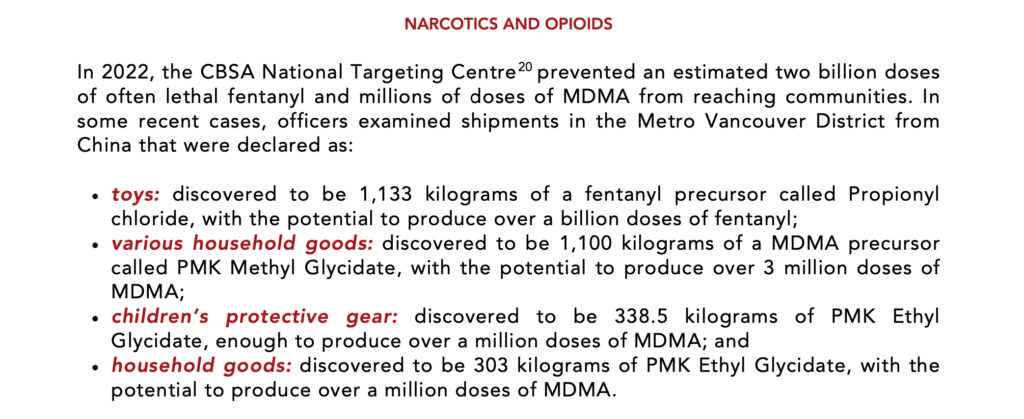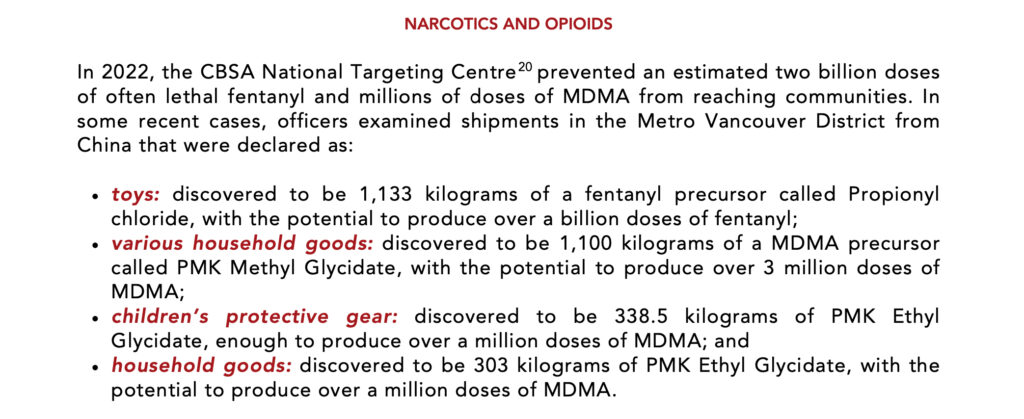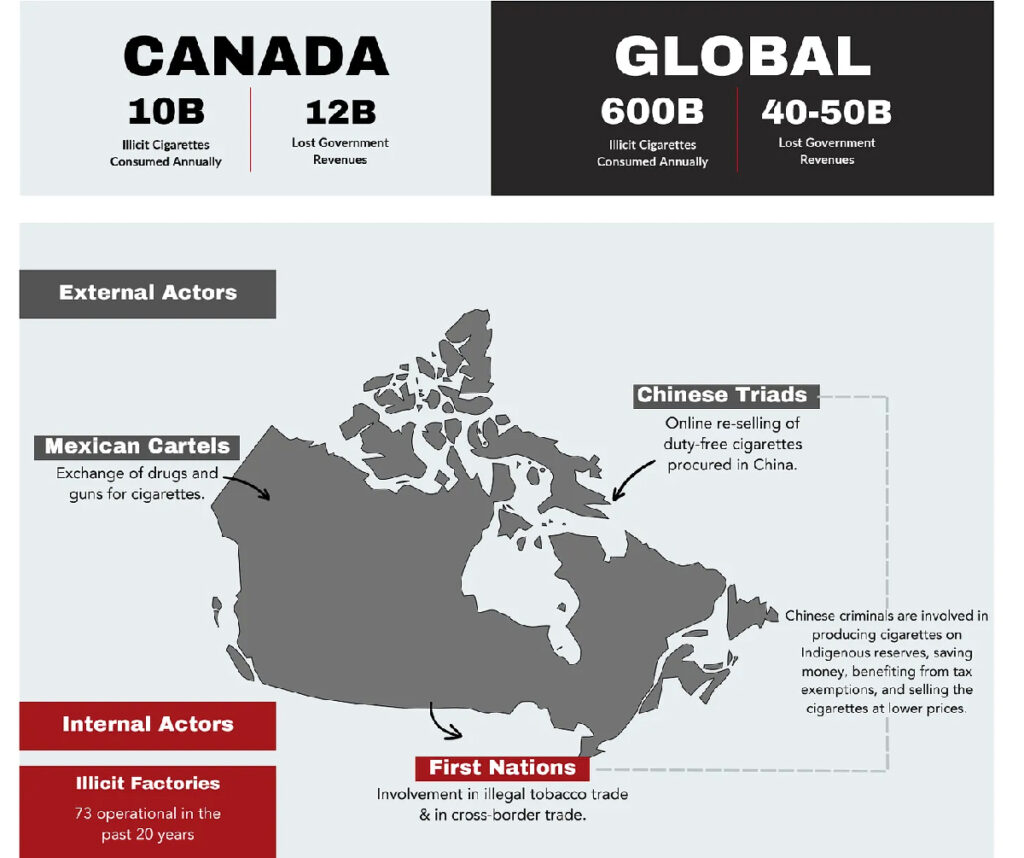“Cross-Border Illicit Trade and Threat Convergence” report calls for urgent national security reforms
(Written by: Sam Cooper, originally printed here in The Bureau, reprinted with permission.)
The network of an elite Chinese Mafia suspect with significant industrial assets in British Columbia has been implicated “in recent RCMP investigations of CCP police stations in Canada, and other countries,” according to a sweeping new report from a United States anti-corruption NGO.
The report cites a collection of stunning cases and statistics to argue that transnational criminal networks with ties to China, Iran and Russia are using Canada to launder tens of billions annually, and related economic and political operations are undermining safety and democracy in the West.
Calling for urgent action in Ottawa, including legal and institutional reforms, it says: “Canada has become a safe zone for the world’s most notorious crime groups and threat networks that are harming Canada’s national security and imperilling the security of other nations.”
The report comes from International Coalition Against Illicit Economies, a Washington, D.C. geopolitical-risk group led by David Luna, a former U.S. State Department and intelligence official.
Luna worked with former senior RCMP transnational crime investigator Calvin Chrustie on this report, which aims to alert Canadian voters and politicians of accelerating criminal penetration over the past decade of Canada’s economy, critical infrastructure and political bodies.
“Canada is currently a hub of illicit trade and crime convergence [and] a weak link within the international financial system for bad actors and threat networks to make illicit profits and launder and hide their dirty money,” the report says.
“No longer is profit the sole motivator for these criminals,” it adds. “These threat convergence activities are now being weaponized against rule of law institutions and democratic states for generating more political power, building illicit empires, and financing greater insecurity globally.”
And Canada is decades behind these threats, because its political, security and legal institutions have failed to adapt.
“In the past, Canadians have focused on mid-level threat actors driven by profit (e.g., Hells Angels) in lieu of more lethal transnational criminal networks that have blended with geopolitical global interests (for example, networks from China, Iran, and Russia),” Luna and Chrustie argue.
The report refers to evidence that recently surfaced in the Cameron Ortis trial.
Evidence agreed upon by Crown and Defence in the case pointed to a multi-billion-dollar money laundering and terror-financing network in Toronto, and a criminal technology hub in Vancouver, that enabled global criminals and terrorists to frustrate Five Eyes law enforcement efforts.
Ortis was found guilty of sharing Five Eyes and RCMP investigation plans with large-scale money launderers connected to Dubai-based criminal mastermind Altaf Khanani, who moved drug money globally and financed Hezbollah and al-Qaeda.
The report also points to deep infiltration of Vancouver’s sea port, where Iranian gangsters with links to Tehran reportedly penetrated federal infrastructure, and where the Big Circle Boys, a transnational mafia directed from Mainland China, has flooded thousands of kilograms of fentanyl precursors into Canada.
It’s just recently been acknowledged by RCMP, the report notes, that Canada has become a fentanyl-production source state, globally.

Luna and Chrustie also cite reporting from The Bureau on a deadly alliance in Canada between organized crime and “state actors in Mexico, China, Iran, and even Russia, that are profiting from the booming multi-billion-dollar illicit markets in Canada.”
“Increasingly, international law enforcement agencies have noted the key role Canada plays in facilitating threat actors,” the report says.
China’s Political Warfare Arm
Citing cutting-edge intelligence of the type only hinted at in the Ortis trial — where much of the evidence was redacted for national security reasons — Luna’s and Chrustie’s report offers a high-level perspective of China’s state-sponsored criminal activity in Canada.
In the Ortis case — which The Bureau will report further on — evidence linking Ortis to potential Chinese espionage efforts was considered by Crown prosecutors, but ultimately blocked by a judge, due to Canadian legal system restrictions.
Some of the evidence under publication ban during the jury trial is emerging after Ortis’ conviction, and will be relevant to his sentencing.
The Ortis case proved RCMP’s former intelligence director was contacting alleged Iranian criminals with deep ties to the Iranian-state and terror-financing.
Luna and Chrustie’s report points to similar types of Chinese networks that Ortis may have been on the cusp of engaging — some in the RCMP believe — when he was arrested in September 2019.
“Operatives affiliated with the People’s Liberation Army, Ministry of State Security, and Ministry of Public Security live in several Canadian cities and liaise locally, and nationally, with Asian Organized Crime networks,” the report says.
“China’s political warfare arm, the united front, is believed to be supported, in part, by proceeds from a variety of criminal enterprises and receive guidance and direction through the Chinese Embassy and consulates in Canada.”
One sensitive case study believed to support this intelligence on interoperability between Triads and China’s Consular and United Front officials, points to Vancouver Island, on Canada’s Western coast.
“A high-level Asian Organized Crime target, with links to PRC United Front associates in Canada, owns and operates a prominent fish processing plant on the west coast of Vancouver Island,” the report says. “The AOC target and his associates have been implicated in recent RCMP investigations of CCP police stations in Canada, and other countries.”
The report says this suspect — who is not named — “was also heavily involved in the underground tourism sector (e.g., gaming, prostitution, hunting, fishing).”
The Bureau has confirmed the suspect was a target of the RCMP’s E-Pirate investigation, which focused on Chinese Triad infiltration of B.C. government casinos.
The report adds, similar to the threat networks active in Vancouver, Chinese Triad-facilitated junket and poaching networks are believed to be active in Canada’s far northern Indigenous communities, which raises foreign interference concerns, as “several actors involved in this sector are also linked to PRC government officials.”

Recommendations
Among a host of reforms Luna and Chrustie recommend:
- Elevate illicit trade as a national security priority and policy area in Canada’s national security frameworks and Parliament.
- Call for a Canadian National Security Strategy that addresses the converging threats posed by organized crime, illicit trade, terrorist financing, and corruptive and malign influence, including alignment with Five Eyes partners and greater cross-border information-sharing and law enforcement operations.
- Authorize the effective implementation and enforcement of a new Racketeer Influenced and Corrupt Organizations (RICO) Act – similar to that in the U.S. Criminal Code – that empowers and strengthens legal tools responding to organized crime.
- Examine the current effectiveness of efforts by all relevant federal, regional, municipal agencies to counter transnational crime and illicit trade and national integration, and assess the current level of Canada and US law enforcement, intelligence, and security cooperation.
- Task the Canadian Security Intelligence Service to coordinate with CBSA, the RCMP and Global Affairs Canada to conduct a new national intelligence estimate on the breath and scale of today’s criminal threats to the national economy and citizen security across key illicit markets.
- Devote more resources to combat the dirty money and corruptive influence of kleptocrats, oligarchs, criminals, and state-sponsored covert operations in Canada.
- Identify foreign kleptocrats, oligarchs, and politically exposed persons (PEPs) who have corrupt relationships targeting Canadian officials and political institutions and freezing and confiscating their assets; and deny their visas.
sam@thebureau.news
Editor’s Note: This story was updated the afternoon of Nov. 27th with report recommendations.









